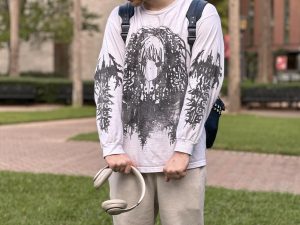Study abroad makes a comeback
March 17, 2022
Despite concerns surrounding the COVID-19 pandemic, nine times as many students are studying abroad this semester compared to last spring, according to Marriette Thomas, director of the Center for International Education.
While students face a longer application process and some programs have been canceled, Loyola is nearing pre pandemic study abroad participation numbers.
“We are very proud of the fact that we have been able to work with university leadership, risk management, and everyone involved to find a way to continue to run our international programs,” Thomas said.
Because of global travel restrictions, many universities were forced to temporarily close or limit their study abroad programs. Despite the constantly changing guidelines, Thomas said that Loyola’s Center for International Education has worked hard to help students become a part of a global community by expanding virtual study abroad programs and helping students navigate petitions and travel restrictions.
If the U.S. Department of State or the Centers for Disease Control and Prevention issues a level three or four travel advisory for a country, the program is suspended by the university, according to Thomas. Currently, 188 out of 211 countries and regions are at a level three or four travel advisory, according to the U.S. Department of State online records.
If a country is restricted, students can submit a waiver that will be reviewed by the Internationalization Review and Advisory Committee and the Provost. If the waiver is declined or the student chooses to not travel because of the advisory, they will be refunded, according to the Center for International Education website.
This semester, 27 students are studying abroad, compared to 24 last semester and three the previous Spring, according to Thomas. Usually, around 40 students study abroad in the spring, Thomas said.
While the Omicron variant posed some concerns, all programs except Australia and New Zealand were able to continue, according to Thomas. Thomas said the Australia and New Zealand programs were canceled because of the countries’ strict travel restrictions, which don’t currently allow international students.
Students currently abroad said that while they’re happy they were able to study abroad, the application process, combined with waivers and navigating travel restrictions, was overwhelming.
“It was really complicated to figure out what I needed,” said Alexandra Zengel, criminology and philosophy junior currently studying in France.
Zengel had difficulty registering for her vaccine pass, which is entirely digital in France. The process took around six weeks, and although Zengel started the process before arriving in France, she spent the first month without a pass.
“Even though I was vaccinated, I had to get a negative (COVID-19) test before I went anywhere,” Zengel said. “It was very inconvenient.”
Adele Colson, psychology junior currently studying in Spain, said she experienced a lot of anxiety about her trip during the height of the Omicron surge this winter.
“I was really worried, and there was a lot of insecurity. I didn’t get much information but after weeks and weeks I finally heard back,” Colson said. “I finally just bought a plane ticket and manifested it,” Colson added.
Colson said that she was originally supposed to go to Spain with a friend, but the uncertainty and fear surrounding COVID-19 caused her friend to cancel the trip.
For students who are uncomfortable traveling abroad because of the pandemic or don’t have the funds, the center for international education has expanded their virtual international programs, Thomas said. Students can earn credits from international universities through virtual exchange programs at four different universities in Japan, Australia, and New Zealand, according to the Center for International Education. There are also summer and j-term programs available.
The center also works with The Intern Group, a virtual internship program, to help students apply for global virtual internships, according to Thomas.
“The idea isn’t for these programs to completely replace study abroad or exchange, it just helps provide an entirely different experience and develop a global perspective,” Thomas said.
Thomas credits the success of the study abroad program to the students’ commitment to safety.
“Students are doing a really good job at tracking control of their health while abroad,” Thomas said.








